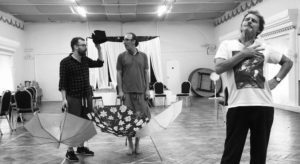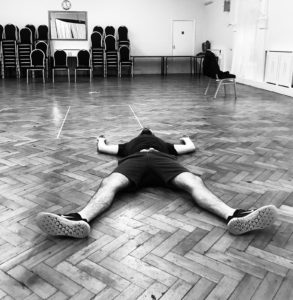Week Two: 5th to 9th of August
By Kaffe Keating
“This is a practice as full of labour as a wise man’s art, for folly that he wisely shows is fit…”
– Viola, Act 3 Scene 1
Restrictions are interesting. It can be frustrating, not being able to fully realise everything that pings into your imagination. ‘They wouldn’t have to worry about this in a normal production!’ you cry. ‘If we had a budget, we’d be fine!’ you wail. ‘If only we had an extra week to do this!’ you whinge to no-one in particular.
It’s the same on every show, but these perceived roadblocks can be looked at in two ways. You can either stop dead on the road you’re on, flummoxed, or continue walking, leaving the path of least resistance and heading into the forest the road would have cut through, the unknown.
It’s week two of rehearsals and we’ve been joined by a guest star Olivia/Maria. We won’t have Claire full-time until week three, due to some commitments she’d made prior to valiantly jumping into the role, so standing in has been the wonderful Jen Higham. Jen’s been on three tours, one of which was a previous production of Twelfth Night, so she’s been an invaluable presence in the room. A prime example of something that initially might seem like a restriction on our process which has immediately become a massive bonus. We began working through the scenes which feature Olivia and Maria, which we’d had to skip last week, and finally the play has started to stitch itself together in front of us.
Umbrellas have become more and more valuable as toys to play with; forming trees to hide behind, swords to ‘fight’ with, and at one point the wheels for a horse and carriage. (I really like the horses but I’m definitely their most vocal advocate – only time can tell if they’ll end up in the glue factory…).
The umbrellas are a prime example of necessity birthing invention. Since we’ve got to fit everything – props, costume, anything remotely resembling a set – into one suitcase, we’re quite limited in what we can use. We need things that are compact, versatile and which can offer lots of different images. As a result we’ve been forced to be really imaginative with what we have and the results are incredibly joyful.
It does make you wonder about big budget theatre, and how having a huge amount of technical capability and money to spend can actually scupper creativity. ‘We need Olivia to enter in a horse and carriage’ – okay, well, let’s just get one. ‘We need some swords’ – bang, there they are. ‘We’re actually bringing in a real box-tree from Hampton Court’. When you’ve got everything at your disposal, there is no need for imaginative solutions to problems and the muscle will inevitably atrophy. This is not to say that all big budget theatre is devoid of creativity — far from it — but in my opinion theatre which enjoys a hefty financial backing is at its most successful when it retains the spirit of whatever it is that forces an actor to turn an umbrella into a toothbrush in front of your eyes.
Since we now have an Olivia/Maria in the room, we’ve been able to look at two scenes in the play which are particularly tricky and long. Act 3, Scene 4 isn’t so much one scene as a collection of about seventeen which all run into each other, and Act 5, Scene 1 is just a mammoth where all the loose ends (or almost all of them at least) are tied up and all the mistaken identities are revealed. These scenes took an entire day each to work through and roughly set, and left everyone pretty knackered in the old brain department.
Our method of working, which continues to serve us well, of muddling through a scene in its entirety once, then again, then again – each time shaping and moulding a bit more – was a bit more grueling with these longer scenes, as it takes ages to get to the stage where everyone can go ‘Whey, we did it!’. However, brain-soupefying as the two and a half days we spent on these scenes were, I feel like we’ve developed some hard-earned stamina which we will surely make use of going forward.
The week rounded out with a stagger-through. You need to walk before you can run, and you need to stagger before you can walk. And stagger we did; props were in the wrong place, people were in the wrong scenes, I definitely said some lines which weren’t anything close to Shakespeare and one of the umbrellas flew from its telescopic handle and across the rehearsal room during one particularly enthusiastic unsheathing of a sword, thankfully no-one was impaled.
But that’s fine. The point of a stagger through is to be rubbish and to have happened. And happen it did. We have a play. It’s messy and mad and surely doesn’t remotely resemble what it will eventually look like when it emerges, undoubtedly resplendent of course, from its chrysalis in Notre Dame. It’s currently a fuzzy, weird looking caterpillar.
But that’s exactly what it’s supposed to be.


